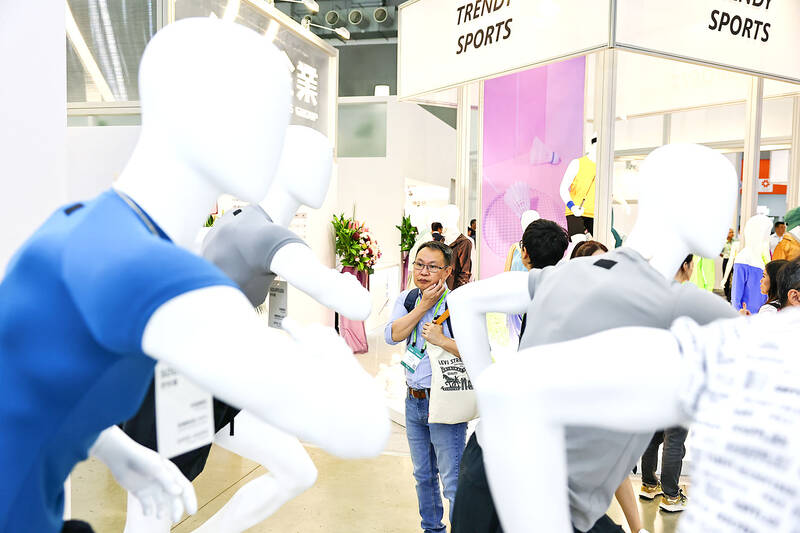The Taipei Innovative Textile Application Show, a sourcing hub for innovative textiles, began at the Taipei Nangang Exhibition Center yesterday with ecofriendly and functional fabrics on display.
Vice President Hsiao Bi-khim (蕭美琴) spoke at the opening ceremony before spending an hour visiting booths set up by domestic exhibitors.
Hsiao said she was pleased to be a spokeswoman for Taiwan’s textiles, given that the industry was the main driving force of Taiwan’s “economic miracle” over the past few decades.

Photo: CNA
“The chip industry is very important, but we can’t only focus on chips,” she said, adding that old-economy sectors also need the support of government policies and incentives to help tackle issues such as labor shortages and green energy availability.
The vice president described herself as a big fan of Taiwan’s textile and fiber products.
“Many of my suits are made of MIT [Made in Taiwan] functional fabrics,” she said, among them the suit she wore at the inauguration ceremony for her and President William Lai (賴清德) on May 20 and the outfit she was wearing yesterday.
Hsiao’s dress at the inauguration event and the suit she wore at the trade show were made using Eclat Textile Co (儒鴻) functional fabrics, industry sources said.
Among the exhibitors at the three-day show are firms that make low-carbon fabrics, with suppliers including Far Eastern New Century Corp (遠東新世紀), Formosa Plastics Group (台塑集團), Lealea Group (力麗集團), Nan Pao Resins Chemical Co (南寶) and New Fibers Textile Corp (新纖實業) showcasing green fiber and textile products.
Nan Pao Resins Chemical chief executive officer Elic Hsu (許明現) said the focus of the company’s display this year is a special fabric that is sweat-resistant, has a soft feel and is composed of up to 53 percent biomaterial content.
It should enter mass-production next year, Hsu said.
At the opening ceremony, Lealea Group chairman James Kuo (郭紹儀), who is chairman of the Taiwan Textile Federation, the event’s organizer, said that the trade show was one of the most important annual events of the domestic textile industry.
This year, 385 manufacturers are participating, included a record 75 overseas exhibitors, signaling that the event has earned the recognition of international peers, Kuo added.
More than 70 international brands have been invited to participate in private meetings with local manufacturers, and visiting delegations from South Korea, Vietnam, India, France and other countries have also been invited to the show, Kuo said.

Sweeping policy changes under US Secretary of Health and Human Services Robert F. Kennedy Jr are having a chilling effect on vaccine makers as anti-vaccine rhetoric has turned into concrete changes in inoculation schedules and recommendations, investors and executives said. The administration of US President Donald Trump has in the past year upended vaccine recommendations, with the country last month ending its longstanding guidance that all children receive inoculations against flu, hepatitis A and other diseases. The unprecedented changes have led to diminished vaccine usage, hurt the investment case for some biotechs, and created a drag that would likely dent revenues and

Global semiconductor stocks advanced yesterday, as comments by Nvidia Corp chief executive officer Jensen Huang (黃仁勳) at Davos, Switzerland, helped reinforce investor enthusiasm for artificial intelligence (AI). Samsung Electronics Co gained as much as 5 percent to an all-time high, helping drive South Korea’s benchmark KOSPI above 5,000 for the first time. That came after the Philadelphia Semiconductor Index rose more than 3 percent to a fresh record on Wednesday, with a boost from Nvidia. The gains came amid broad risk-on trade after US President Donald Trump withdrew his threat of tariffs on some European nations over backing for Greenland. Huang further

CULPRITS: Factors that affected the slip included falling global crude oil prices, wait-and-see consumer attitudes due to US tariffs and a different Lunar New Year holiday schedule Taiwan’s retail sales ended a nine-year growth streak last year, slipping 0.2 percent from a year earlier as uncertainty over US tariff policies affected demand for durable goods, data released on Friday by the Ministry of Economic Affairs showed. Last year’s retail sales totaled NT$4.84 trillion (US$153.27 billion), down about NT$9.5 billion, or 0.2 percent, from 2024. Despite the decline, the figure was still the second-highest annual sales total on record. Ministry statistics department deputy head Chen Yu-fang (陳玉芳) said sales of cars, motorcycles and related products, which accounted for 17.4 percent of total retail rales last year, fell NT$68.1 billion, or

MediaTek Inc (聯發科) shares yesterday notched their best two-day rally on record, as investors flock to the Taiwanese chip designer on excitement over its tie-up with Google. The Taipei-listed stock jumped 8.59 percent, capping a two-session surge of 19 percent and closing at a fresh all-time high of NT$1,770. That extended a two-month rally on growing awareness of MediaTek’s work on Google’s tensor processing units (TPUs), which are chips used in artificial intelligence (AI) applications. It also highlights how fund managers faced with single-stock limits on their holding of market titan Taiwan Semiconductor Manufacturing Co (TSMC, 台積電) are diversifying into other AI-related firms.